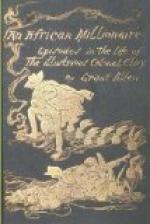The worst of it all was, while Medhurst was with us, by some curious fatality, Colonel Clay stopped away from us. Now and again, to be sure, we ran up against somebody whom Medhurst suspected; but after a short investigation (conducted, I may say, with admirable cleverness), the spy always showed us the doubtful person was really some innocent and well-known character, whose antecedents and surroundings he elucidated most wonderfully. He was a perfect marvel, too, in his faculty of suspicion. He suspected everybody. If an old friend dropped in to talk business with Charles, we found out afterwards that Medhurst had lain concealed all the time behind the curtain, and had taken short-hand notes of the whole conversation, as well as snap-shot photographs of the supposed sharper, by means of a kodak. If a fat old lady came to call upon Amelia, Medhurst was sure to be lurking under the ottoman in the drawing-room, and carefully observing, with all his eyes, whether or not she was really Mme. Picardet, padded. When Lady Tresco brought her four plain daughters to an “At Home” one night, Medhurst, in evening dress, disguised as a waiter, followed them each round the room with obtrusive ices, to satisfy himself just how much of their complexion was real, and how much was patent rouge and Bloom of Ninon. He doubted whether Simpson, Sir Charles’s valet, was not Colonel Clay in plain clothes; and he had half an idea that Césarine herself was our saucy White Heather in an alternative avatar. We pointed out to him in vain that Simpson had often been present in the very same room with David Granton, and that Césarine had dressed Mrs. Brabazon’s hair at Lucerne: this partially satisfied him, but only partially. He remarked that Simpson might double both parts with somebody else unknown; and that as for Césarine, she might well have a twin sister who took her place when she was Mme. Picardet.
Still, in spite of all his care—or because of all his care—Colonel Clay stopped away for whole weeks together. An explanation occurred to us. Was it possible he knew we were guarded and watched? Was he afraid of measuring swords with this trained detective?
If so, how had he found it out? I had an inkling, myself—but, under all the circumstances, I did not mention it to Charles. It was clear that Césarine intensely disliked this new addition to the Vandrift household. She would not stop in the room where the detective was, or show him common politeness. She spoke of him always as “that odious man, Medhurst.” Could she have guessed, what none of the other servants knew, that the man was a spy in search of the Colonel? I was inclined to believe it. And then it dawned upon me that Césarine had known all about the diamonds and their story; that it was Césarine who took us to see Schloss Lebenstein; that it was Césarine who posted the letter to Lord Craig-Ellachie! If Césarine was in league with Colonel Clay, as I was half inclined to surmise, what more natural than her obvious dislike to the detective who was there to catch her principal? What more simple for her than to warn her fellow-conspirator of the danger that awaited him if he approached this man Medhurst?




